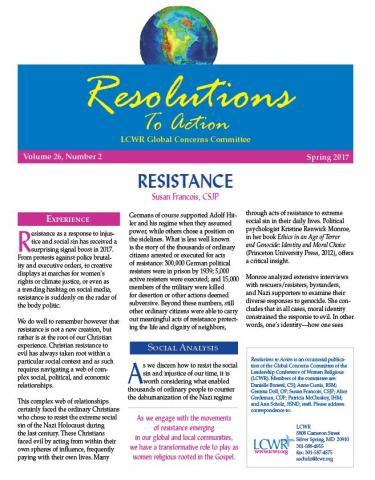
Resistance
by Susan Francois, CSJP
Experience
Resistance as a response to injustice and social sin has received a surprising signal boost in 2017. From protests against police brutality and executive orders, to creative displays at marches for women’s rights or climate justice, or even as a trending hashtag on social media, resistance is suddenly on the radar of the body politic.
We do well to remember however that resistance is not a new creation, but rather is at the root of our Christian experience. Christian resistance to evil has always taken root within a particular social context and as such requires navigating a web of complex social, political, and economic relationships.
This complex web of relationships certainly faced the ordinary Christians who chose to resist the extreme social sin of the Nazi Holocaust during the last century. These Christians faced evil by acting from within their own spheres of influence, frequently paying with their own lives. Many Germans of course supported Adolf Hitler and his regime when they assumed power, while others chose a position on the sidelines. What is less well known is the story of the thousands of ordinary citizens arrested or executed for acts of resistance: 300,000 German political resisters were in prison by 1939; 5,000 active resisters were executed; and 15,000 members of the military were killed for desertion or other actions deemed subversive. Beyond these numbers, still other ordinary citizens were able to carry out meaningful acts of resistance protecting the life and dignity of neighbors, coworkers, and even strangers.
To read more, please download the PDF document below.
